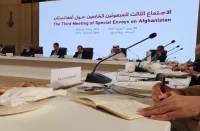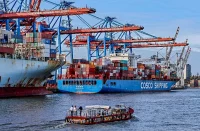By Nikita Mendkovich (Russia)
The activities of NATO’s intelligence services in Afghanistan have long been the subject of conjecture and supposition, and that has sometimes made it difficult to analyze events in the country, forcing us to look for traces in various events and practices. My goal in writing this article is to provide an objective analysis of their activities, goals, methods and capabilities in Afghanistan.
Despite the fact that the ISAF has an independent intelligence analysis staff (CJ2) at its disposal, most of the operational work in the country is carried out by the national-level intelligence agencies of individual NATO countries. The CIA plays a leading role in providing intelligence support for coalition forces in Afghanistan; the intelligence services of Great Britain and Germany are also active there.
According to official US information, its Afghan regional intelligence organization is one of the largest in the world. The Agency has more than 800 personnel in the country, including operatives, analysts and technical specialists. In addition, a number of organizations employing several thousand local residents are actually subordinate to the local CIA apparatus. They include the Committee for Combating Serious Crimes (CCSC) and the military Counterterrorism Investigation Group, which has 3000 Afghan soldiers.
The regional unit’s head office is located in Kabul. The CIA has a total of 18 local stations, located in most of the country’s provinces. Those in the west and the south are especially active. The stations usually operate under the cover of various coalition force support units, Western firms and humanitarian organizations. Their operations include handling agents and collecting intelligence using communications intercept and unmanned aerial vehicles. It has also been reported that in Afghanistan the CIA is using an effective system for monitoring telephone communications; however, we have no information about its structure and operation.
The CIA has the following basic missions in the region: fighting the Taliban and al-Qaeda, and intelligence collection in the neighboring countries of Pakistan and Iran. No information is available about the Agency’s operations in the regions bordering on China and Central Asia, although reports recently emerged about increased CIA intelligence activities in Tajikistan.
Electronic intelligence collected by aircraft and communications intercept is especially significant. During the early years of the war, it was employed to eliminate a number of warlords, but the use of this type of intelligence to carry out missile and bomb strikes is currently controversial. The damage inflicted on enemy personnel is sufficient to justify the high civilian casualties that result from these attacks.
There is reason to believe that CIA operatives and analysts are not generally well qualified: many are specialists on other areas, Arab studies experts, for example; and they rarely have a good knowledge of Pashto or are sufficiently familiar with tribal problems in Pashtun regions. Despite the extent of the agent network, it also is not always adequate. Boosting personnel strength by hiring new employees apparently will only exacerbate the problem.
The low-level of secrecy in CIA operations in Kabul is also worthy of mention. Leaks of classified documents to the American press are a constant problem, and there is a brisk trade in electronic copies in Kabul. However, it is possible that the leaks come from the military headquarters and the diplomatic corps, which provides some of the materials.
In the regions bordering Iran the CIA is establishing a base for conducting agent activities against that country on a par with counterterrorist operations. There are numerous reports about CIA support to opposition forces in Iran, including Kurdish and Baluchi separatists [S. Hersh. “Preparing the Battlefield: The Bush Administration steps up its secret moves against Iran,” The New Yorker, July 7, 2008]. Iran’s intelligence services insist that the CIA is even using al-Qaeda fighters to organize armed clashes in Iran, and they support their claims with published confessions from people they have arrested. Accordingly, Iran has officially identified the CIA as a terrorist organization.
On the whole, a study of CIA operations in Afghanistan by Russian specialists indicates that the media have greatly exaggerated its capabilities in the region.
The intelligence services of other countries are less active in the country; they primarily support CIA operations in the areas their military forces are responsible for.
The British intelligence services in Afghanistan are primarily represented by MI5 (state security), MI6, (foreign intelligence) and GCHQ (information security). The total number of British operatives is supposedly small, although the MI6 station in Kabul is considered to be the largest in the world. MI6’s main function in the country is to seek overt contacts with Taliban warlords for negotiations. MI6 also assists the CIA in working with captured Taliban. MI5 is concerned with security for the British contingent, and it also studies the problem of British citizens and permanent residents participating in Taliban units [Guardian, November 11, 2010].
By all accounts, the British intelligence services do not have a large number of people who speak Pashto, and they are not trying to increase their number. Of course, British intelligence avoids hiring large numbers of new employees, which the CIA in Afghanistan is now doing.
MI6 is believed to have an agent network in Afghanistan’s northern provinces through which it conducts operations in Central Asia; however, it is currently impossible to confirm or deny that. There is reason to believe that the backbone of Britain’s agent network in Afghanistan is made up of former Northern Alliance activists, including those currently holding government positions.
Germany’s foreign intelligence service, BND, is also operating in Afghanistan. It apparently does not take on missions as global in nature as those of the CIA. There is little information available about the numbers and qualifications of German intelligence personnel. There are presumably several hundred of them, most of whom are communications specialists and analysts.
BND operations in Afghanistan are best known for electronic intelligence, particularly the monitoring of Internet traffic. German specialists were implicated in a number of scandals involving the intercept of personal communications among high-ranking Afghan officials, including Commerce Minister Amin Farhang (2007) [Der Spiegel, April 28, 2008]. Reportedly, however, the BND did not develop traffic analysis algorithms; it simply hacked the mailboxes of people they were interested in.
The BND operates as a surrogate police force in the German Army’s area of responsibility, attempting to independently investigate terrorist attacks and find those responsible. German terrorists who joined al-Qaeda and fight for it in Afghanistan (the ethnic Moroccan Bekkai Harah, for example) are a particular problem for the BND.
There presumably are few German agents among the country’s political elite. Most are political activists who lived in European exile during the 1990s.
The author does not claim to have done a complete analysis of all NATO intelligence activities in the region, but he believes that this description will give readers a general idea of the limits of their capabilities and their methods of operation.
Nikita Mendkovich is a historian, economist, and expert at the Center for Modern Afghanistan Studies (Russia).
Source: New Eastern Outlook














NATO’s real role in Afghanistan is to let non-Americans fight an american war which was planned in Tel Aviv. It was planned to increase the production of Ppppy cultivation to meet the demand of the Russian Jewish drug Mafia, which has been completed by raising annual Poppy production of 167 ton per year under Taliban to 6,000 ton under US occupation.
The other agenda for occupation, a pipeline from Caspian Sea to Pakistani port of Gwadar via Afghanistan – and from thereon shipping of crude oil to the Haifa refinery in Israel. Kyrgyzstan-born Israeli billionaire, Alexander Machkevitch, owns a lion-share of oil fields in his native country.
http://rehmat1.wordpress.com/2009/02/13/afghanistan-occupied-for-drugs/
Very Helpful Your Page….
thanks shearing your post…..
awesome your post i liked……..
amazing your post………..
Lovely………….
very helpful your post…………